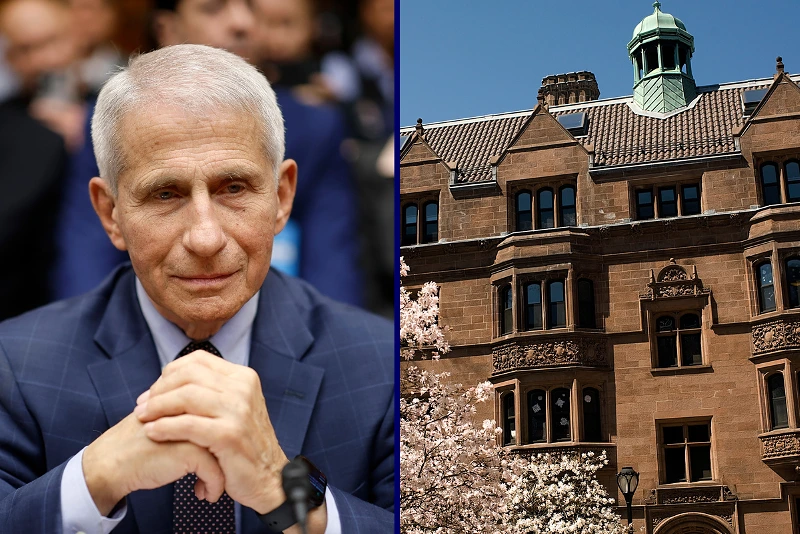 |
| (L) Dr. Anthony Fauci, former Director of the National Institute of
Allergy and Infectious Diseases, arrives to testify before the House
Oversight and Accountability Committee Select Subcommittee on the
Coronavirus Pandemic at the Rayburn House Office Building on June 03,
2024 in Washington, DC. / (R)
Trees bloom on the campus of Yale University on April 16, 2008 in New
Haven, Connecticut. Yale University’s top experts have identified an extremely concerning condition associated with mRNA COVID-19 vaccines – which they say has been shown to alter the biology of your body. The “post-vaccination syndrome” is a previously unidentified illness that seems to cause exercise intolerance or fatigue, tinnitus, dizziness, and brain fog, among other issues. Years after receiving the initial injection and boosters, patients can also exhibit noticeable biological alterations — such as variations in immune cells and the presence of coronavirus proteins in their blood.
Additionally, the condition seems to reactivate Epstein-Barr, a virus that can cause flu-like symptoms, nerve issues, and swollen lymph nodes. Nonetheless, the Yale scientists tried to reassure the public’s worries, maintaining that the findings “are still a work in progress,” and the finalized results of the study have not yet been published. However, the results from the reputable university indicate that additional study on post-vaccination syndrome is required, according to independent specialists. Finding out who is most at risk and how common the illness is will be the next stage of the study.
Between December 2022 and November 2023, Iwasaki’s team took blood samples from at least 42 individuals with post-vaccination syndrome (PVS) and 22 individuals without it for the new, non-peer-reviewed study.
The scientists also examined 134 “healthy” vaccination recipients and 134 individuals with “long COVID,” since symptoms of PVS overlap with it. However, in March last year, Australian medical researchers at Queensland Health claimed that the term “long COVID” should be thrown out and not taken seriously. They argued that the symptoms of those who have said to be afflicted for at least a year were no different from those of any ordinary virus, like the flu. Meanwhile, regarding Yale’s recent COVID-19 vaccine study, Epstein-Barr syndrome appeared to be reactivated in both PVS patients and those who noted symptoms of “long COVID.” Epstein-Barr is an infection that is shared through bodily fluids like semen or saliva, and over 90% of adults are said to have had it at some point in their lives. The virus remains dormant in the body after symptoms like fever, rashes, and exhaustion go away — but it can also reactivate when the immune system is weak. Additionally, COVID-19 spike protein levels were also much higher in PVS patients. Some of the long-term symptoms are believed to be caused by these persistent spike proteins, which tend to keep the body in an inflammatory state.
In addition, Dr. Harlan Krumholz, a co-senior study author, and Harold H. Hines, a junior professor of Medicine at Yale, commented on the concerning discovery in a joint statement as well.
The National Library of Medicine website, which is run by the National Institutes of Health, has also since reported some alarming information in regard to myocarditis, which is inflammation of the heart muscle, and mRNA COVID-19 vaccines.
Myocarditis can be fatal, and a percentage of those with myocarditis may end up needing a heart transplant. Stay informed! Receive breaking news blasts directly to your inbox for free. Subscribe here. https://www.oann.com/alerts |


No comments:
Post a Comment